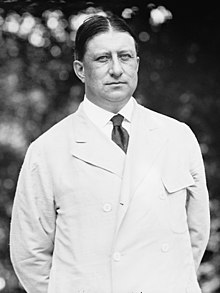William Barnes Jr. | |
|---|---|
 Harris & Ewing photo of Barnes as a member of the Republican National Committee in 1912 | |
| Chairman of the New York Republican State Committee | |
| In office January 21, 1911 – September 30, 1914 | |
| Preceded by | Ezra P. Prentice |
| Succeeded by | Frederick C. Tanner |
| Member of the Republican National Committee from New York | |
| In office June 24, 1912 – June 9, 1916 | |
| Preceded by | William L. Ward |
| Succeeded by | Herbert Parsons |
| U.S. Surveyor of Customs for the Port of Albany | |
| In office January 31, 1899 – February 28, 1911 | |
| Preceded by | John P. Masterson |
| Succeeded by | Luther C. Warner |
| Personal details | |
| Born | November 17, 1866 Albany, New York, US |
| Died | June 25, 1930 (aged 63) Armonk, New York, US |
| Resting place | Albany Rural Cemetery, Menands, New York |
| Political party | Republican |
| Spouse(s) | Grace Davis, m. 1888–1922 (divorced) Maude (Fiero) Battershall, m. 1923–1929 (her death) |
| Relations | Thurlow Weed (grandfather) Catherine Weed Barnes (sister) |
| Children | 2 |
| Parent(s) | William Barnes Sr. Emily Peck Weed |
| Education | Harvard University |
| Profession | Newspaper publisher |
William Barnes Jr. (November 17, 1866 – June 25, 1930) was an American journalist and politician. The longtime owner and publisher of the Albany Evening Journal, Barnes was most notable as a major behind the scenes player in state and U.S. politics as a leader of New York's Republican Party.
Barnes was born in Albany, New York, and graduated from The Albany Academy in 1884 and Harvard University in 1888. He worked briefly as a newspaper reporter for the Albany Evening Journal before purchasing the Albany Morning Express, of which he was publisher and editor. In 1889 he purchased the Evening Journal, of which he was also editor and publisher. Barnes became active in New York politics as a leader of the Republican Party. In 1891, he became head of the party in both the city and in Albany County. In 1899, Republican nominee James H. Blessing won the election for mayor. This victory brought about Republican dominance in Albany, and Barnes went on to serve as a member of the New York Republican State Committee from 1892 to 1914, and the committee's chairman from 1911 to 1914. He was a delegate to the Republican National Conventions of 1904, 1908, and 1912, and a member of the Republican National Committee from 1912 to 1916. As an ally of Thomas C. Platt, Barnes became a major figure in national Republican politics; his support for successive Republican presidents William McKinley, Theodore Roosevelt, and William Howard Taft led to his appointment as the U.S. Surveyor of Customs for the Port of Albany, a lucrative position he held from 1899 to 1911. In 1915, he was a delegate to the New York state constitutional convention.
In 1912, Barnes was a key player in obtaining the Republican presidential nomination for the incumbent Taft; in response, Roosevelt ran as the candidate of the Progressive Party, and the split among Republicans helped elect the Democratic nominee, Woodrow Wilson. In a July 1914 editorial, Roosevelt accused Barnes of being a corrupt party boss who conspired with the Democratic Tammany Hall leader Charles Francis Murphy to block progressive reforms in New York. Barnes sued Roosevelt for libel, and the 1915 trial ended with a verdict in favor of Roosevelt. For several years afterwards, Barnes lived in New York City while maintaining his voting residence in Albany.
In 1921, Democrat William Stormont Hackett won the mayor's office, ending Barnes' dominance over Albany politics and ushering in more than 50 years of control by the Democratic organization of Daniel P. O'Connell. In 1925, Barnes sold the Evening Journal to Stephen Carlton Clark, after which he retired and lived in Armonk. He died at his home in Armonk on June 25, 1930, and was buried at Albany Rural Cemetery.
© MMXXIII Rich X Search. We shall prevail. All rights reserved. Rich X Search
